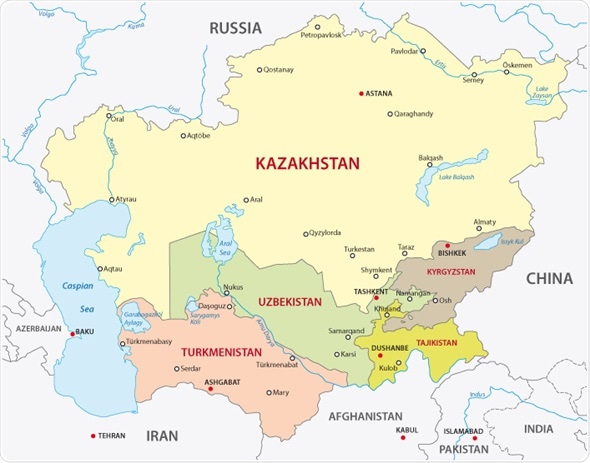Launching 1st March 2023. Also check out: https://www.thailandmedical.news/
Central Asia consists of the countries Kazakhstan, Uzbekistan, Kyrgyzstan, Tajikistan, and Turkmenistan. This region is bounded by the Caspian Sea and China on either side, while Russia is its northern boundary.

While it is fun to travel to these places, you should take great care to preserve your health and even your life, such as:
Vaccines that are expected to be taken by all travelers include:
The MMR vaccine
The MMR vaccine protects travelers against catching mumps, measles, and rubella infections. If all travelers were vaccinated appropriately, this would prevent a huge proportion of infections from being brought back into the host country to affect other unvaccinated people.
Proper precautions include:
Other childhood vaccines
These are expected to have been routinely taken in childhood, and include:
Other vaccines which are recommended for travelers to this region include:
Hepatitis A
Hepatitis A virus is transmitted by contaminated food and water, as well as by close personal contact. It is preventable by two doses of the vaccine at an interval of at least 6 months.
Hepatitis B
This virus is passed by sexual contact as well as through contaminated body fluids such as blood transfusion. Three doses are required, at 0, 30, and 180 days. An accelerated schedule is also sometimes available. It is more than 90% effective. Most children in developed countries receive this vaccine in infancy.
Hepatitis B vaccine is indicated in the following cases:
Rabies
This is especially important for travelers who will be involved in outdoors adventures, such as trekking, hiking, or camping, and for those who will be in close contact with animals.
Children are more susceptible to bites on the neck and head, and should also receive the vaccine. Pre-exposure prophylaxis consists of three doses of the vaccine, on day 0, 7, and either 21 or 28.
Typhoid
This bacterium is carried in soiled food and water. Both injectable and oral vaccines are available, and your healthcare practitioner will advise you which one is suitable for your trip. Its efficacy ranges from only 50-80%, so that you should take care not to expose yourself to unhealthy or contaminated food.
Yellow fever
This vaccine is not required for your safety in Central Asia, but some countries, as in Kyrgyzstan, demand proof of this vaccination if you come from a country where yellow fever exists.